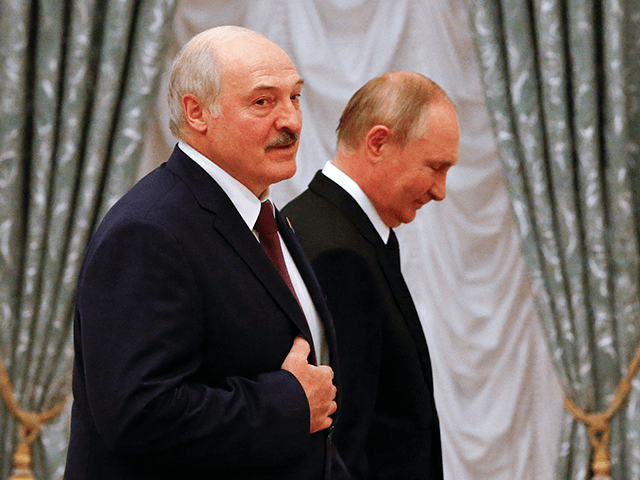Belarusian dictator Alexander Lukashenko met in Moscow on Thursday with Russian President Vladimir Putin to put the finishing touches on a 28-point plan that will more tightly integrate Belarus with Russia.
Putin said after the meeting that Lukashenko and his negotiators agreed to programs including the integration of currency, indirect taxes, counterterrorism programs, and energy policies, including a single electric power market for both countries.
The UK Guardian noted the full text of the agreements was not made public and there was no signing ceremony.
“While the two sides announced new economic agreements, they stopped short of introducing a common currency or going into detail on any defence or political agreements, signalling a limit to the extent of the negotiations,” the Guardian observed.
“Russians and Belarusians will be guaranteed equal rights and opportunities,” Putin said, while Lukashenko declared the two nations are “stronger” together.
The Wall Street Journal (WSJ) took a more cynical view on Thursday, suggesting Lukashenko accelerated the twenty-year-old integration initiative and dropped some long-standing Belarusian demands because he faces “intense opposition and political turmoil at home following last summer’s disputed presidential vote and sanctions from the West.”
The benefits Lukashenko is receiving from his closer partnership with Putin include combat aircraft, surface-to-air missiles, and Russian military training centers, giving him more protection against both foreign powers and his own restless people. Putin reportedly also agreed to continue selling natural gas to Belarus at a discount and loan Lukashenko another $630 million to keep the Belarusian economy afloat.
Analysts wryly noted that Russian troops tend to be the worst houseguests – quick to show up when invited, but very difficult to get rid of when their welcome wears out – but Lukashenko is apparently willing to take that risk to have more weapons and better-trained troops at his disposal.
In fact, the Belarusian dictator said on Thursday he would be willing to embrace even closer integration with Russia “instantly,” should he “feel the needs of his people,” or more likely if the people start coming through his palace windows.
Putin endorsed Lukashenko’s rule and said Belarus has “notably stabilized” under his leadership. He chided Western nations for being more willing to hold talks with the Taliban in Afghanistan than poor “Aleksandr Grigoryevich Lukashenko,” who “did not come to power as a result of armed conflict” – an assertion the terrorized Belarusian opposition might quibble with, having been either jailed or chased out of the country after Lukashenko allegedly rigged the 2020 election.
Russia and Belarus began a major joint military exercise called Zapad 2021 on Friday, ostensibly involving 200,000 troops, although some Western analysts believe those claims are inflated. Zapad means “West,” and the exercise simulates a battle with NATO, although Putin risibly insisted the exercise is “not targeting anyone” in particular.
“However, conducting these exercises is logical given that other alliances, for example NATO, are moving fast to build their military presence close to the borders of the Union State and the Collective Security Treaty Organization countries,” Putin said on Friday, referring to Russia and Belarus as a single fused “Union State.”
“The establishment of a ‘union state’ between Russia and Belarus was first agreed to in the 1990s, envisioning a common legislature and currency. But to Mr. Putin’s apparent frustration, Mr. Lukashenko dragged his feet on closer political integration with Russia for years – instead making overtures to Europe and profiting from playing Moscow and the West off each other,” the New York Times (NYT) observed Thursday.
The NYT’s coverage suggested Putin’s tighter embrace of Belarus might be intended as a signal to the Belarusian opposition and its Western supporters that Belarus will not be allowed to drift out of Moscow’s orbit, even if Lukashenko loses his grip on power.

COMMENTS
Please let us know if you're having issues with commenting.